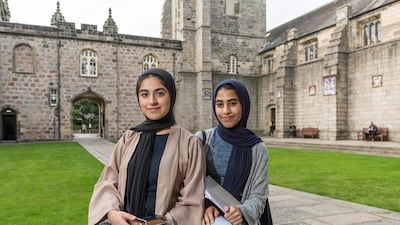In the far north-east of Scotland lies a city that has something in common with the UAE - a strong link to the petroleum industry.
Known as the Granite City because many of its buildings are made from this light-coloured stone, Aberdeen has a port that is the busiest in the UK when it comes to dealing with North Sea oil.
But five young Emirati students who recently moved there are not learning about the petroleum sector. Instead, they are pioneers in an annual programme in which UAE students train to become doctors.
The two men and three women have been awarded scholarships by the UAE Government and have recently begun a premedical year before, it is hoped, starting a five-year medical degree in 2017.
Among the group is Fatma Al Addouli, who describes becoming a doctor as her “lifelong dream”. The ambitious 17-year-old, the second-oldest of four children, is determined to become a heart surgeon.
“I wanted to prove women could be as strong as men; nobody thought women could be surgeons,” said Fatma, who is originally from Fujairah but who more recently has been living in Dubai.
“Ever since I was a kid I have wanted to help people. I’ve always wanted to be an influence on people’s lives.”
Once qualified, Fatma would like to pursue postgraduate study abroad but is also keen to work in the Emirates.
The youngsters faced a rigorous selection procedure to secure scholarships from the Ministry of Higher Education. And they will only be able to begin the five-year medical degree if they complete the premedical year with good grades and perform well at interview.
For a number of years, the University of Aberdeen has had a similar tie-up with Kuwait that has seen students from there study medicine in the city.
The new link with the UAE — cemented by the signing in July of a memorandum of understanding by the university and the UAE Embassy in London — is “really important”, said Professor Stephen Davies, academic head of the pre-medical course.
“People are unlikely to apply to Aberdeen ‘on spec’; they need to know about the place and know people have come in previous years,” he said.
“There’s a diversity of students in the population; we need a diversity of medical students to match that.”
Dating back to 1495, the university is the fifth-oldest in the UK and is consistently ranked among the world’s top 150 institutions in the QS World University Rankings.
According to the UAE Embassy in London, about 3,500 students from the UAE study in the UK, putting the Emirates second in the Gulf region for total numbers, behind Saudi Arabia.
There are eight students in total on this year’s pre-medical course in Aberdeen — the three others are from Kuwait and Saudi Arabia — and about 180 in each year of the main medical degree.
Although Aberdeen has little in common with the UAE in terms of climate, with average low temperatures in January and February of zero degrees Celsius, the students, who arrived about three weeks ago, are enjoying their experiences so far.
“The area is very nice. The weather is different from the UAE. It’s full of nature. The people here are really nice and friendly. We’ve changed our habits — we don’t go by car, we go walking,” said Rouda Al Maazmi, 17, from Sharjah.
Rouda, who has three brothers and one sister, had been to the UK before, having previously stayed in Swanage, on the south coast of England.
“I decided to go to the UK specifically because of my experiences before. I think it’s a great place to study and to live,” she said.
“My sister and mother didn’t want me to go … they felt sad, but now they’re really proud of me.”
Fatma, too, is settling in well and said she had socialised with “so many people” from different parts of the world.
“I feel comfortable with them. Everyone here copes with each other and they accept each other’s cultures,” she said.
newsdesk@thenational.ae


